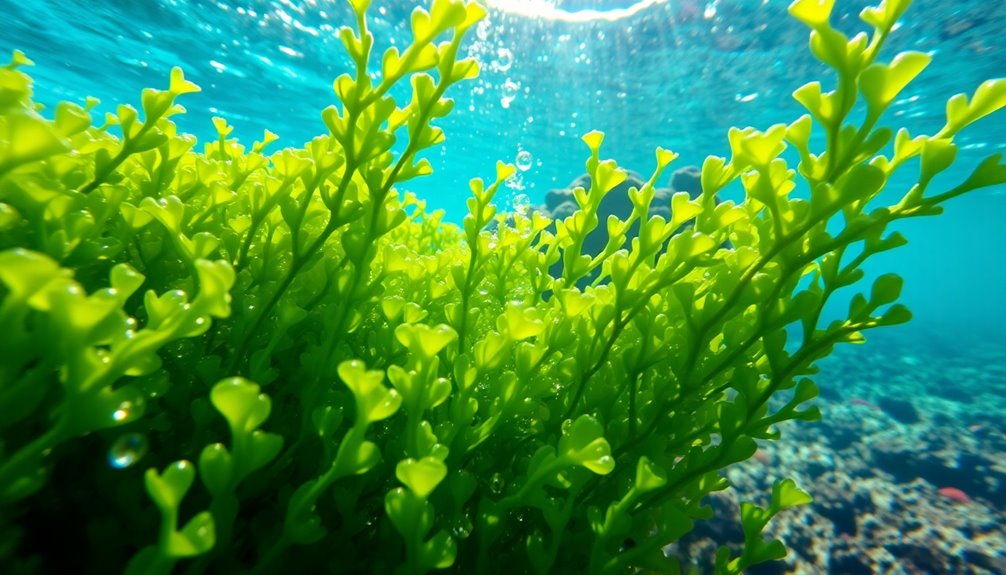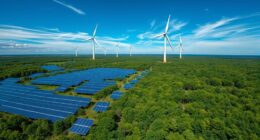Algae's potential as a renewable resource is impressive. It grows rapidly, efficiently absorbs carbon dioxide, and produces high levels of protein, making it ideal for food and biofuels. Plus, it can help combat plastic pollution by creating biodegradable bioplastics. Algae also plays a crucial role in wastewater treatment, improving water quality while reducing harmful chemicals. With all these benefits, exploring how algae can enhance sustainability and combat environmental challenges is truly exciting.
Key Takeaways
- Algae efficiently convert sunlight into energy, absorbing carbon dioxide and producing oxygen, aiding in climate change mitigation.
- With rapid growth rates, algae can be sustainably harvested, doubling biomass in just days for various applications.
- Algae serve as a source for biofuels, producing oil faster than traditional crops and reducing land and water usage.
- Bioplastics derived from algae are eco-friendly, biodegradable, and reduce reliance on petroleum-based materials, contributing to sustainable practices.
- Nutritionally, algae are rich in proteins, essential fatty acids, vitamins, and minerals, enhancing diets and promoting health.
The Science Behind Algae: Understanding Its Unique Properties
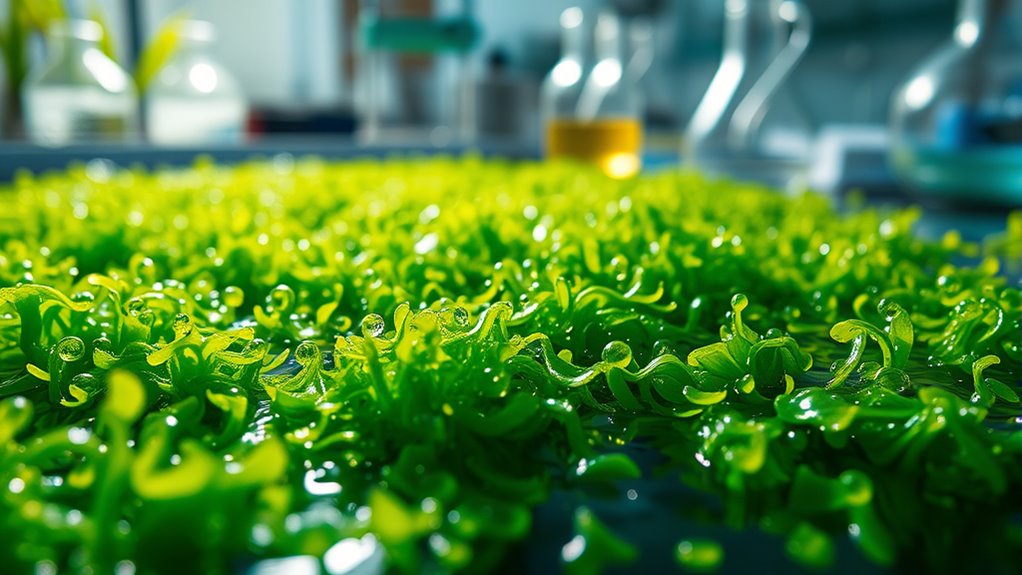
Algae, often overlooked, play a crucial role in our ecosystem and hold immense potential as a renewable resource.
You might be surprised to learn that these simple organisms possess unique properties that make them incredibly versatile. Algae can photosynthesize efficiently, converting sunlight into energy while absorbing carbon dioxide. This process not only produces oxygen but also helps combat climate change.
Additionally, they grow rapidly, doubling in biomass within days, which means you can harvest them sustainably. Some species contain high levels of proteins, vitamins, and essential fatty acids, making them valuable for food and nutraceuticals.
Algae in Biofuels: A Sustainable Energy Source
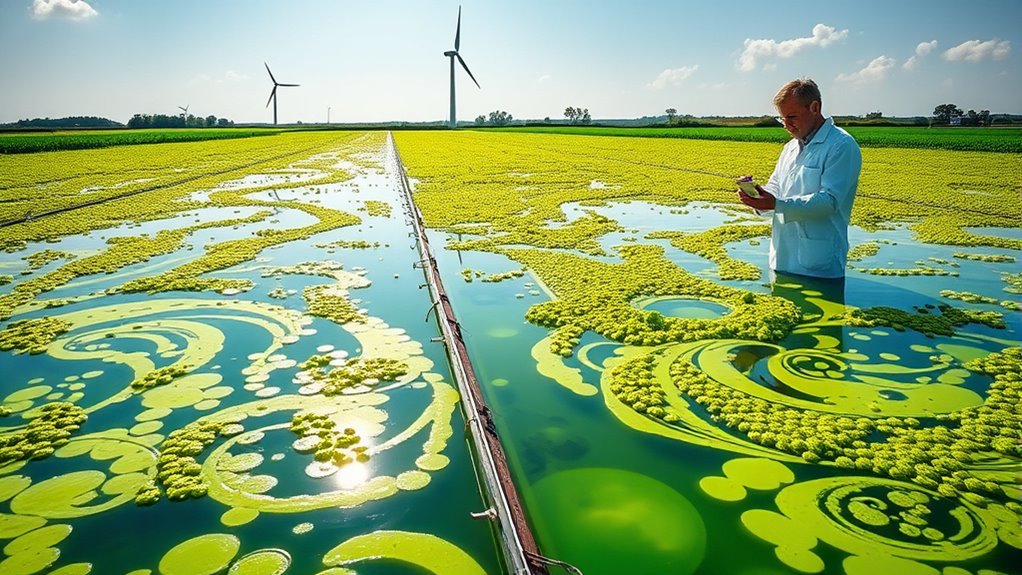
As the world seeks cleaner energy alternatives, biofuels derived from algae have emerged as a promising solution.
You'll find that algae can produce oil much more efficiently than traditional crops, requiring less land and water. This makes it an attractive option for sustainable energy.
Algae can thrive in various environments, including wastewater, which means they can help in pollution reduction while generating fuel.
Furthermore, the oil extracted from algae can be converted into biodiesel, a renewable substitute for fossil fuels.
By choosing algae-based biofuels, you're supporting a cleaner future and reducing greenhouse gas emissions.
As technology advances, you can expect even greater efficiency and cost-effectiveness from algae, solidifying its role in the renewable energy landscape.
Bioplastics and Algae: Reducing Plastic Waste

In the quest to combat plastic pollution, bioplastics derived from algae offer an innovative solution. These eco-friendly materials can significantly reduce the reliance on petroleum-based plastics, which harm our environment.
By utilizing algae, you're tapping into a renewable resource that grows quickly and absorbs carbon dioxide. This process not only curbs plastic waste but also minimizes greenhouse gas emissions.
You can find algae-based bioplastics in various applications, from packaging to disposable utensils. They're biodegradable, breaking down naturally and preventing long-lasting pollution.
As industries shift toward sustainable practices, embracing algae bioplastics can help you make a positive impact. By choosing products made from algal sources, you're contributing to a cleaner planet and promoting a circular economy.
Nutritional Benefits of Algae: A Superfood for the Future
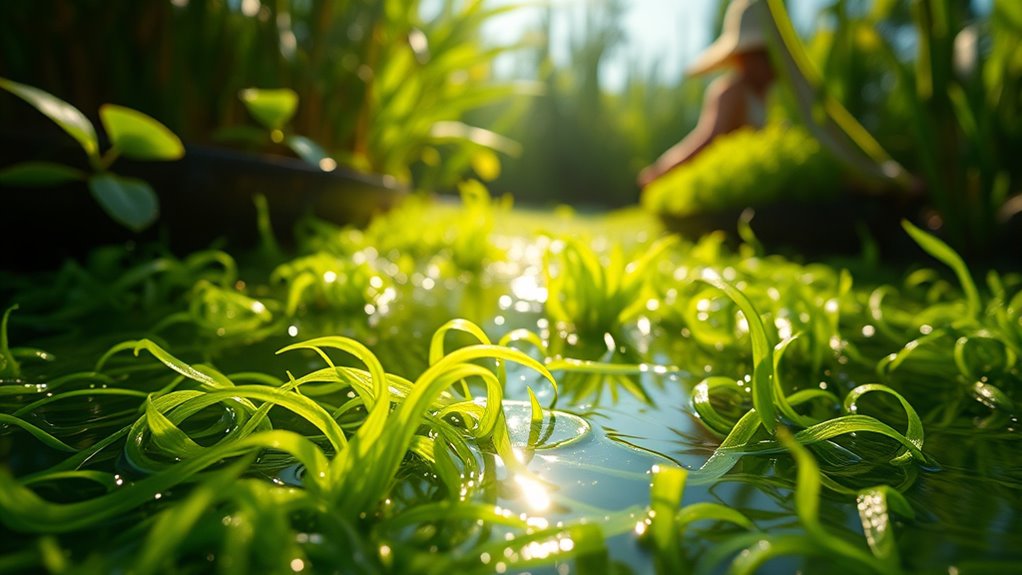
While exploring the benefits of algae as a sustainable resource, it's important not to overlook its incredible nutritional potential.
Algae packs a powerful punch of vitamins, minerals, and antioxidants, making it a fantastic superfood for your diet. You'll find essential fatty acids, like omega-3s, which promote heart health and reduce inflammation.
Algae is a nutrient powerhouse, filled with vitamins, minerals, and omega-3s that support heart health and reduce inflammation.
Plus, algae is rich in protein, offering a complete amino acid profile that supports muscle growth and recovery. Its high fiber content aids digestion, while antioxidants help combat oxidative stress.
Incorporating algae into your meals can boost your nutrient intake and enhance your overall health. Whether you choose spirulina, chlorella, or seaweed, adding these nutrient-dense options can transform your diet and contribute to a healthier lifestyle.
Algae in Wastewater Treatment: Cleaning Our Waterways

Using algae in wastewater treatment not only cleans our waterways but also offers an eco-friendly solution to a pressing environmental challenge. When you incorporate algae, they absorb nutrients like nitrogen and phosphorus, which are common pollutants in wastewater. This process helps prevent harmful algal blooms in nearby lakes and rivers.
Plus, algae can produce oxygen during photosynthesis, enhancing water quality.
You'll find that using algae reduces the need for harsh chemicals, making the treatment process safer for ecosystems. Moreover, after treating wastewater, the harvested algae can be repurposed into biofuels, fertilizers, or animal feed.
Frequently Asked Questions
How Does Algae Cultivation Impact Local Ecosystems?
When you cultivate algae, you'll notice various impacts on local ecosystems. Algae can enhance water quality by absorbing excess nutrients, which helps reduce harmful algal blooms.
However, if not managed properly, it might outcompete native species, disrupting the food chain. You may also observe changes in habitat structures as algae grow.
Balancing cultivation with ecological considerations ensures that you benefit from algae while protecting the local environment. Managing these effects is crucial for sustainability.
What Are the Economic Costs of Large-Scale Algae Production?
You might be surprised to learn that the economic costs of large-scale algae production can vary widely.
Initially, start-up costs for equipment, land, and technology can be significant. However, once established, operational costs often decrease as efficiency improves.
You'll also need to factor in ongoing expenses like maintenance and labor.
Despite the challenges, many industries see potential returns in sustainable products, making it an intriguing area for investment and growth.
Can Algae Be Grown in Any Climate or Environment?
Yes, you can grow algae in various climates and environments, but some factors matter.
Warm temperatures and sunlight boost growth, making tropical and subtropical areas ideal. However, you can also cultivate algae in colder regions using controlled environments, like greenhouses.
Nutrient availability and water quality play crucial roles, too. With the right setup, you can successfully grow algae almost anywhere, adapting your methods to the specific conditions of your location.
How Does Algae Compare to Other Renewable Resources?
Algae could be the superhero of renewable resources! When you compare it to solar or wind energy, algae grows faster and requires less space, making it incredibly efficient.
It absorbs carbon dioxide and produces oxygen, helping combat climate change. Unlike solar panels or wind turbines, algae can thrive in various conditions, maximizing its potential.
Plus, it's versatile for biofuels, food, and even cosmetics, giving you endless possibilities for sustainable solutions.
What Are the Challenges in Commercializing Algae Products?
You'll face several challenges when commercializing algae products.
First, scaling up production can be costly and complex.
Then there's the issue of regulatory hurdles, which can slow down the process.
Market acceptance also poses a challenge; consumers may be hesitant to embrace unfamiliar products.
Additionally, competition from established industries can hinder growth.
Finally, ensuring consistent quality and sustainability in production is vital for long-term success, requiring ongoing innovation and investment.
Conclusion
In exploring the potential of algae, it's clear that this remarkable organism could revolutionize our approach to sustainability. Did you know that algae can produce up to 30 times more oil per acre than traditional crops? This makes it a powerhouse for biofuels and more. By harnessing algae's unique properties, we can tackle some of our biggest environmental challenges, from reducing plastic waste to cleaning our waterways. Embracing algae might just be the key to a greener future.
